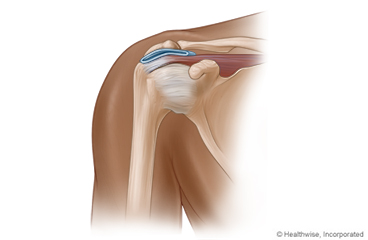
What is shoulder arthroscopy?
Shoulder arthroscopy is a type of surgery. It lets a doctor repair shoulder problems without making a large cut (incision).
To do this surgery, the doctor puts a lighted tube through small incisions in your shoulder. The tube is called an arthroscope or scope. Next, the doctor puts some surgical tools in the scope to help make any repairs. The incisions will leave scars that usually fade with time.
This type of surgery is used to treat many shoulder problems.
- Osteoarthritis.
-
This happens when your cartilage breaks down. Cartilage is the hard, thick tissue that cushions the joints. For this problem, the doctor shaves and smooths rough surfaces on the shoulder joint.
- Loose body.
-
This is a loose piece of bone or cartilage. It's often caused by an injury. The doctor may put the loose piece back in place. Sometimes the piece is removed.
- Impingement syndrome.
-
This happens when shoulder tissue starts to swell and rub against a bone. This can occur in the tendons of the rotator cuff. Or it may happen in the tendons that connect the bicep to the shoulder. It can also occur in the bursa, the sac between the rotator cuff and the top of the shoulder blade. To fix this problem, your doctor removes the bursa and part of the bone from the point of your shoulder. This increases the space in the shoulder area. In a few weeks, the bursa re-forms.
Most people go home on the day of the surgery. When you can go back to work or your usual activities depends on your shoulder problem. You will probably need about 6 weeks or longer to recover.
How do you prepare for surgery?
Surgery can be stressful. This information will help you understand what you can expect. And it will help you safely prepare for surgery.
 Preparing for surgery
Preparing for surgery
- You may need to shower or bathe with a special soap the night before and the morning of your surgery. The soap contains chlorhexidine. It reduces the amount of bacteria on your skin that could cause an infection after surgery.
- Be sure you have someone to take you home. Anesthesia and pain medicine will make it unsafe for you to drive or get home on your own.
- Understand exactly what surgery is planned, along with the risks, benefits, and other options.
- If you take a medicine that prevents blood clots, your doctor may tell you to stop taking it before your surgery. Or your doctor may tell you to keep taking it. (These medicines include aspirin and other blood thinners.) Make sure that you understand exactly what your doctor wants you to do.
- Tell your doctor ALL the medicines, vitamins, supplements, and herbal remedies you take. Some may increase the risk of problems during your surgery. Your doctor will tell you if you should stop taking any of them before the surgery and how soon to do it.
- Make sure your doctor and the hospital have a copy of your advance directive. If you don't have one, you may want to prepare one. It lets others know your health care wishes. It's a good thing to have before any type of surgery or procedure.
What happens on the day of surgery?
-
Follow the instructions exactly about when to stop eating and drinking. If you don't, your surgery may be canceled. If your doctor told you to take your medicines on the day of surgery, take them with only a sip of water.
-
Take a bath or shower before you come in for your surgery. Do not apply lotions, perfumes, deodorants, or nail polish.
-
Do not shave the surgical site yourself.
-
Take off all jewelry and piercings. And take out contact lenses, if you wear them.
At the hospital or surgery center
-
Bring a picture ID.
-
The area for surgery is often marked to make sure there are no errors.
-
You will be kept comfortable and safe by your anesthesia provider. You may be asleep or have medicine to relax you. And if you're awake, the area will be numbed. It's often numbed even if you are asleep.
-
The surgery will take about 1 to 2 hours. It depends on what type of shoulder problem you have.
When should you call your doctor?
- You have questions or concerns.
- You don't understand how to prepare for your surgery.
- You become ill before the surgery (such as fever, flu, or a cold).
- You need to reschedule or have changed your mind about having the surgery.
Where can you learn more?
Go to http://www.healthwise.net/patientEd
Enter W180 in the search box to learn more about "Shoulder Arthroscopy: Before Your Surgery".
Current as of: July 31, 2024
Author: Ignite Healthwise, LLC Staff
Clinical Review Board
All Healthwise education is reviewed by a team that includes physicians, nurses, advanced practitioners, registered dieticians, and other healthcare professionals.

